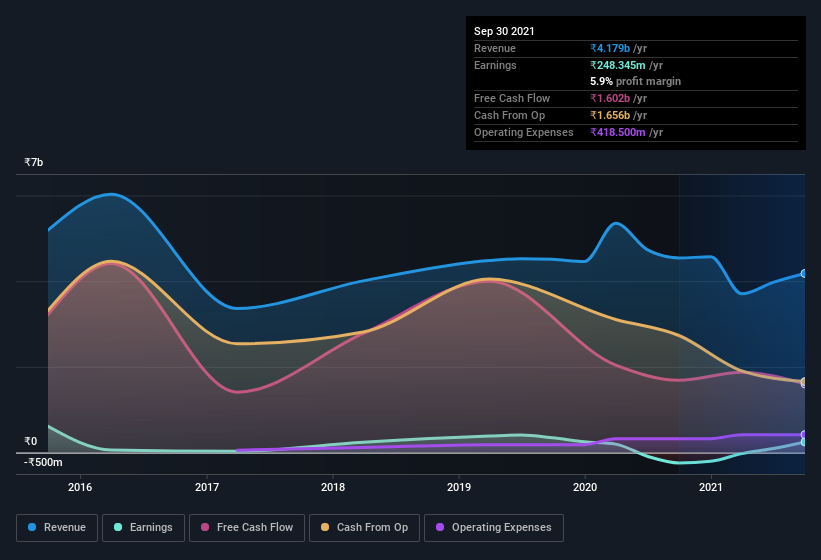- India
- /
- Construction
- /
- NSEI:BFUTILITIE
We Like BF Utilities' (NSE:BFUTILITIE) Earnings For More Than Just Statutory Profit

BF Utilities Limited's (NSE:BFUTILITIE) recent earnings report didn't offer any surprises, with the shares unchanged over the last week. We did some digging, and we think that investors are missing some encouraging factors in the underlying numbers.
See our latest analysis for BF Utilities

Zooming In On BF Utilities' Earnings
As finance nerds would already know, the accrual ratio from cashflow is a key measure for assessing how well a company's free cash flow (FCF) matches its profit. To get the accrual ratio we first subtract FCF from profit for a period, and then divide that number by the average operating assets for the period. This ratio tells us how much of a company's profit is not backed by free cashflow.
That means a negative accrual ratio is a good thing, because it shows that the company is bringing in more free cash flow than its profit would suggest. While it's not a problem to have a positive accrual ratio, indicating a certain level of non-cash profits, a high accrual ratio is arguably a bad thing, because it indicates paper profits are not matched by cash flow. To quote a 2014 paper by Lewellen and Resutek, "firms with higher accruals tend to be less profitable in the future".
For the year to September 2021, BF Utilities had an accrual ratio of -0.10. Therefore, its statutory earnings were quite a lot less than its free cashflow. To wit, it produced free cash flow of ₹1.6b during the period, dwarfing its reported profit of ₹248.3m. BF Utilities' free cash flow actually declined over the last year, which is disappointing, like non-biodegradable balloons. However, that's not all there is to consider. The accrual ratio is reflecting the impact of unusual items on statutory profit, at least in part.
Note: we always recommend investors check balance sheet strength. Click here to be taken to our balance sheet analysis of BF Utilities.
How Do Unusual Items Influence Profit?
Surprisingly, given BF Utilities' accrual ratio implied strong cash conversion, its paper profit was actually boosted by ₹174m in unusual items. We can't deny that higher profits generally leave us optimistic, but we'd prefer it if the profit were to be sustainable. When we analysed the vast majority of listed companies worldwide, we found that significant unusual items are often not repeated. And that's as you'd expect, given these boosts are described as 'unusual'. If BF Utilities doesn't see that contribution repeat, then all else being equal we'd expect its profit to drop over the current year.
Our Take On BF Utilities' Profit Performance
In conclusion, BF Utilities' accrual ratio suggests its statutory earnings are of good quality, but on the other hand the profits were boosted by unusual items. Based on these factors, it's hard to tell if BF Utilities' profits are a reasonable reflection of its underlying profitability. So while earnings quality is important, it's equally important to consider the risks facing BF Utilities at this point in time. When we did our research, we found 4 warning signs for BF Utilities (3 can't be ignored!) that we believe deserve your full attention.
In this article we've looked at a number of factors that can impair the utility of profit numbers, as a guide to a business. But there are plenty of other ways to inform your opinion of a company. Some people consider a high return on equity to be a good sign of a quality business. While it might take a little research on your behalf, you may find this free collection of companies boasting high return on equity, or this list of stocks that insiders are buying to be useful.
Valuation is complex, but we're here to simplify it.
Discover if BF Utilities might be undervalued or overvalued with our detailed analysis, featuring fair value estimates, potential risks, dividends, insider trades, and its financial condition.
Access Free AnalysisThis article by Simply Wall St is general in nature. We provide commentary based on historical data and analyst forecasts only using an unbiased methodology and our articles are not intended to be financial advice. It does not constitute a recommendation to buy or sell any stock, and does not take account of your objectives, or your financial situation. We aim to bring you long-term focused analysis driven by fundamental data. Note that our analysis may not factor in the latest price-sensitive company announcements or qualitative material. Simply Wall St has no position in any stocks mentioned.
Have feedback on this article? Concerned about the content? Get in touch with us directly. Alternatively, email editorial-team (at) simplywallst.com.
About NSEI:BFUTILITIE
Good value with adequate balance sheet.
Market Insights
Community Narratives


